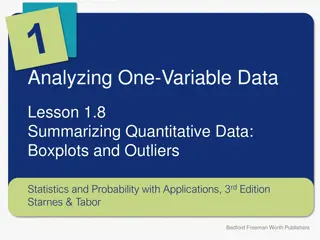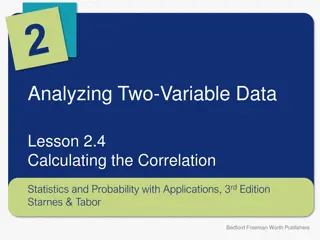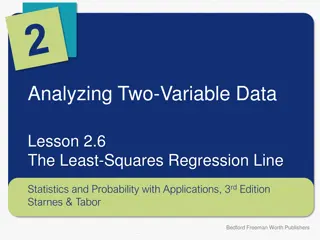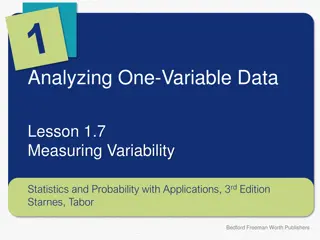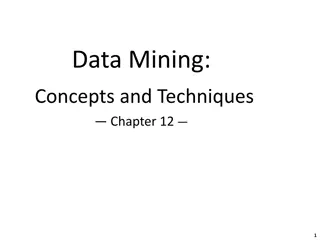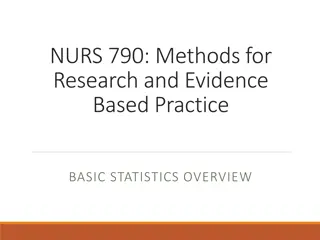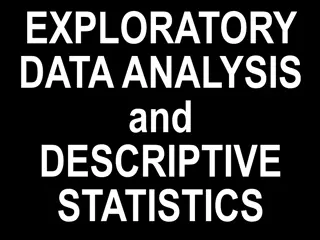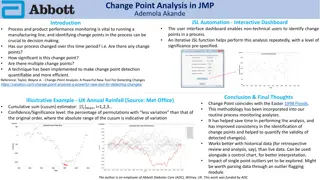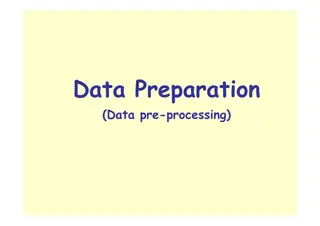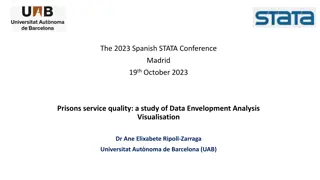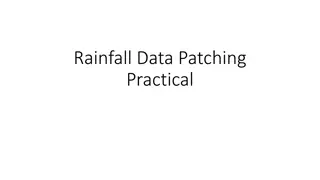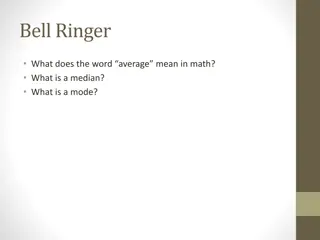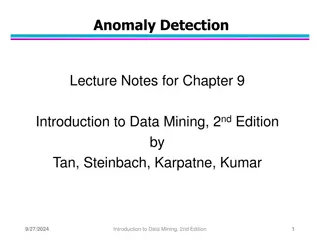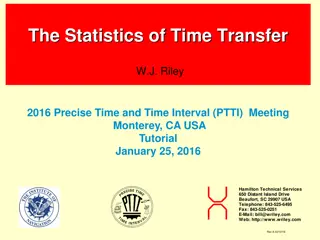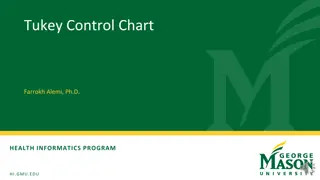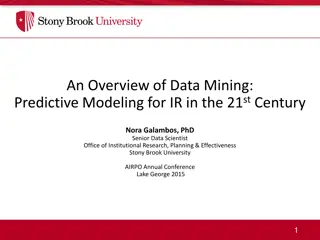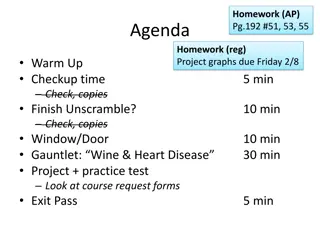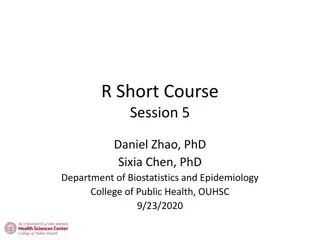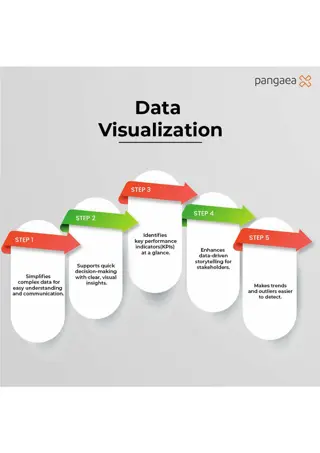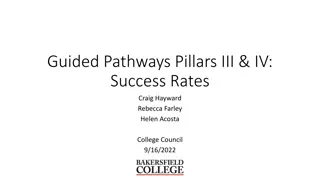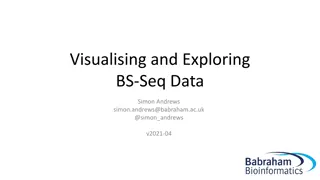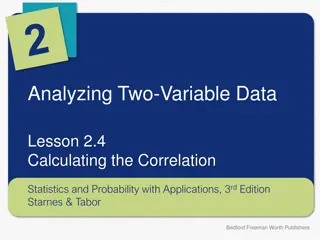National Conference of Enforcement Chiefs: Enhancing Tax Compliance and Enforcement Practices
The National Conference of Enforcement Chiefs held by the Commercial Taxes Department, Government of Andhra Pradesh, focused on nurturing tax compliance, targeting evasion cases, preventing harassment, and overseeing tax administration to curb high-pitch demands. The enforcement wing emphasized data
0 views • 16 slides
Understanding Robust Estimation Methods for Handling Outliers in Data Analysis
This content delves into the importance of robust estimation in dealing with outliers in data analysis. It covers topics such as moving averages, the impact of outliers, reasons for outlier occurrence, and the robustness of median compared to mean calculations. Additionally, it explores moving media
1 views • 34 slides
Understanding Boxplots and Identifying Outliers in Quantitative Data Analysis
Learn how to interpret boxplots, identify outliers using the 1.5 x IQR rule, and compare distributions of quantitative data. Explore examples like Barry Bonds' home run records and tablet thickness measurements to enhance your statistical analysis skills.
0 views • 21 slides
Understanding Box Plots: A Visual Overview of Data Analysis
Box plots, also known as Whisker Box Plots, are an effective method for graphically representing numerical data through quartiles. They provide a concise display of data distribution including the median, quartiles, and outliers. Learn how to create, customize, and interpret box plots in R with exam
2 views • 7 slides
Understanding Correlation in Two-Variable Data Analysis
This content discusses calculating the correlation between two quantitative variables, its properties, and how outliers can influence the correlation. It provides a step-by-step guide on how to calculate the correlation coefficient 'r' using z-scores. Additionally, it presents a practical problem of
0 views • 18 slides
Understanding Box Plots: A Complete Guide with Examples
Box plots, also known as whisker plots, are an effective way to visually represent numerical data by depicting quartiles, median values, and outliers. They offer a compact display of information, making it easy to compare samples and analyze the symmetry of data. This article covers the basics of bo
0 views • 7 slides
VCE Physics Study Design 2023-2027: Overview of Key Science Skills and Changes
Explore the revised VCE Physics study design for 2023-2027, focusing on key changes such as the introduction of eight scientific methodologies, the shift from "reliability" to "repeatability and reproducibility," extrapolation techniques, constructing linearised graphs, identifying outliers, disting
0 views • 37 slides
Understanding Least-Squares Regression Line in Statistics
The concept of the least-squares regression line is crucial in statistics for predicting values based on two-variable data. This regression line minimizes the sum of squared residuals, aiming to make predicted values as close as possible to actual values. By calculating the regression line using tec
0 views • 15 slides
Understanding Variability in One-Variable Data Analysis
Exploring the concept of variability in statistical analysis of one-variable data, focusing on key measures such as range, interquartile range, and standard deviation. Learn how to interpret and calculate these metrics to understand the spread of data points and identify outliers. Utilize quartiles
0 views • 19 slides
Understanding Outlier Analysis in Data Mining
Outliers are data objects that deviate significantly from normal data, providing valuable insights in various applications like fraud detection and customer segmentation. Types of outliers include global, contextual, and collective outliers, each serving distinct purposes in anomaly detection. Chall
0 views • 44 slides
Understanding Basic Statistics in Research and Evidence-Based Practice
Basic statistics play a crucial role in research and evidence-based practice. Descriptive statistics help summarize data, while inferential statistics make inferences about populations based on samples. Various types of statistics like hypothesis testing, correlation, confidence intervals, and signi
3 views • 15 slides
Exploratory Data Analysis and Descriptive Statistics in Statistical Analysis
Exploratory Data Analysis involves understanding data characteristics through visualization techniques like bar graphs, pie charts for qualitative data and histograms, scatterplots for quantitative data. It includes calculating mean, median for center, range, standard deviation for spread, and ident
1 views • 7 slides
Understanding Correlation in Quantitative Variables
Explanation of how to calculate correlation between two quantitative variables, the importance of outliers in correlation, and the impact of strength and direction on the correlation coefficient.
0 views • 26 slides
Interactive Change Point Analysis Dashboard in JMP by Ademola Akande
Explore the iterative JSL automation function for detecting change points in processes. Significance levels impact the identification of change points, enhancing decision-making in manufacturing line performance monitoring. Historical data analysis and conjunction with control charts improve interpr
0 views • 4 slides
Importance of Data Preparation in Data Mining
Data preparation, also known as data pre-processing, is a crucial step in the data mining process. It involves transforming raw data into a clean, structured format that is optimal for analysis. Proper data preparation ensures that the data is accurate, complete, and free of errors, allowing mining
1 views • 37 slides
Connected Thermostats Stakeholder Meeting Insights
In this stakeholder meeting, various topics such as administrative updates, data call results, accuracy of temperature readings, sharing of data sets, and discussions on temperature measurements accuracy were covered. Debates on regional baselines, outliers removal validity, savings drives, demograp
1 views • 15 slides
Efficiency Methodological Approaches in Prisons Service Quality Study
Exploring efficiency methodologies in analyzing prisons service quality, this study focuses on parametric and non-parametric approaches such as Data Envelopment Analysis (DEA) and Stochastic Frontier Analysis (SFA). It delves into benchmarking techniques, productivity analysis, and the implications
0 views • 21 slides
Update on HV Tuning Procedure for KM3NeT Group Meeting
Recap and updates on the HV tuning procedure for the KM3NeT group meeting include moving to a procedure based on gain estimates, implementing HV-fitting routines in JFitHV, and addressing issues related to linear behavior, fit ranges, and outliers. Solutions for maximizing the ToT-fits efficiency ar
0 views • 11 slides
Advanced Techniques in Relational Data Outlier Detection
This document delves into cutting-edge methods for outlier detection in relational data, focusing on profile-based and model-based approaches such as leveraging Bayesian networks, feature generation, and individual feature vector summarization. The examples provided showcase the application of these
1 views • 30 slides
Practical Rainfall Data Patching Techniques for Improved Accuracy
Utilize advanced data patching methods to enhance the accuracy of rainfall data in the Southern Africa region. Select and assess gauges, screen for outliers, and apply patching techniques to ensure data integrity for analysis and decision-making.
0 views • 6 slides
Algorithmic Issues in Tracking: A Deep Dive into Mean Shift, EM, and Line Fitting
Delve into algorithmic challenges in tracking tasks, exploring techniques like mean shift, Expectation-Maximization (EM), and line fitting. Understand the complexities of differentiating outliers and inliers, with a focus on segregating points into best-fit line segments.
0 views • 44 slides
Understanding Outliers in Aggregate Queries with Scorpion
Many datasets contain outliers discovered through aggregation. Scorpion aims to explain outliers, improve model quality, and enhance efficiency in outlier problem diagnosis. The paper discusses related work, technical definitions, difficulties in finding influential predicates, and the architecture
0 views • 18 slides
Exploring Lifespans: From Mayflies to Humans
Discover the fascinating range of lifespans in the animal kingdom, from the brief 24-hour existence of a mayfly to the centuries-long life of a Greenland shark. While humans typically live 70-80 years, outliers like Jeanne Louise Calment, who lived to 122, show that age is not a definitive factor. T
0 views • 6 slides
Understanding Measures of Central Tendency in Math
In mathematics, the average, median, mode, and range are essential measures of central tendency used to organize and summarize data for better understanding. The mean refers to the middle value of a dataset without outliers, while the median is the middle number when the data is ordered. The mode re
0 views • 14 slides
Beyond Numerical MIXATON for Outlier Explanation on Mixed-Type Data SEKE 2022 Special Session ADPBD
This presentation delves into outlier detection in mixed-type data, exploring approaches, evaluation methods, and conclusions. Motivated by the need for detailed outlier explanations, it discusses deep learning ensemble techniques and the challenges of understanding why certain data points are flagg
0 views • 31 slides
Anomaly Detection in Data Mining: Understanding Outliers and Importance
Anomaly detection is crucial in data mining to identify data points significantly different from the norm. This technique helps in recognizing rare occurrences like ozone depletion anomalies. Understanding the distinction between noise and anomalies is key, as anomalies can provide valuable insights
0 views • 35 slides
Understanding Time Transfer Statistics in Technical Services
Time transfer in technical services involves transmitting time information between locations, with a focus on statistical measures like Time Deviation (TDEV). This process assesses the noise affecting systems using specialized tools for time and frequency stability analysis. The performance of time
0 views • 29 slides
Understanding Tukey Control Chart in Health Informatics Program at GMU
Explore the Tukey Control Chart methodology as part of the Health Informatics Program at George Mason University (GMU). Learn about the seven essential steps including assumptions, outliers, median, fourths, and control limits to enhance data analysis and decision-making in healthcare settings.
0 views • 29 slides
Deficiencies in Nuclear Data Evaluations and Uncertainty Assessment
In this document, Roberto Capote from IAEA discusses deficiencies in neutron data evaluations and statistical models for uncertainty assessment. The content covers topics such as USU definition, identification of outliers, and what is not considered USU. Various neutron data standards and evaluation
0 views • 14 slides
Robust Bichromatic Classification Using Two Lines
This collection of images and descriptions illustrates the concept of robust bichromatic classification using two lines to separate points in linear programming. Various scenarios, such as minimizing red/blue outliers and addressing violations, are explored along with different approaches for separa
0 views • 40 slides
Largest Red-Blue Separating Rectangles Study
This study explores the problem of finding the largest area axis-aligned B-empty rectangle containing n red points and m blue points. The research discusses various extensions to the original problem, such as the Blue Rectangles problem and the Outliers Problem, aiming to achieve efficient solutions
0 views • 20 slides
Data Mining: Overview and Best Practices for Predictive Modeling
Data mining involves utilizing various methods to analyze and extract valuable insights from a vast amount of data. This process includes data wrangling to prepare the data for analysis, examining missing data, studying distributions, and identifying outliers. Training, validation, and test partitio
0 views • 29 slides
Analyzing SAT Mathematics and Critical Reading Scores
This content covers a regression analysis between SAT Mathematics and Critical Reading scores, including calculating the regression line, predicting scores, identifying outliers, interpreting residuals, slopes, and y-intercepts, and assessing the relationship between exercise habits and fast-food co
0 views • 15 slides
R Short Course Session 5 Overview: Linear and Logistic Regression
In this session, Dr. Daniel Zhao and Dr. Sixia Chen from the Department of Biostatistics and Epidemiology at the College of Public Health, OUHSC, cover topics on linear regression including fitting models, checking results, examining normality, outliers, collinearity, model selection, and comparison
0 views • 44 slides
Maximize Business Impact with Data Visualization
This infographic shows how data visualization simplifies complex data, supports decision-making, highlights KPIs, and enhances data-driven storytelling. Its an essential tool for identifying trends and outliers. Discover expert data visualization talent at Pangaea X by visiting www.pangaeax.com.
7 views • 1 slides
Analyzing Success Rates and Disproportionate Impact in Academic Courses
The analysis delves into courses with low success rates, examining factors contributing to outliers and equity implications. Courses like XXXXB1A and XXXXB36 show historically poor success rates. Additionally, disproportionate impacts are observed among Black, Asian, Hispanic, and White students. Th
0 views • 8 slides
Understanding Measures of Central Tendency in Statistics
Measures of central tendency, such as mean, median, and mode, play a crucial role in statistics by indicating the central position of a data set. Mean is the average, while median is the middle value when data is arranged in order. These measures provide insights into data distribution, with mean ca
2 views • 12 slides
Visualising and Exploring BS-Seq Data: Tips and Insights
Explore essential strategies for analysing BS-Seq data, ranging from selecting appropriate methylation contexts to identifying coverage outliers and biases. Understand how to interpret data patterns, handle unusual findings, and mitigate potential errors, ensuring accurate methylation analysis resul
0 views • 40 slides
Understanding Correlation in Statistics
This lesson delves into calculating the correlation between two quantitative variables, exploring properties of correlation, addressing how outliers affect correlation values, and more. You will learn the steps to calculate correlation, understand its properties, and the importance of variable type
0 views • 10 slides
CITI Bike Trip Data Analysis - Insights and Observations
Preliminary, time series, spatial, modeling, and safety analyses were conducted on CITI Bike trip data from 2013 to 2016. The data quality assessment led to the removal of outliers. Key observations include an increasing number of bike trips with a seasonal pattern, hot spots located in specific are
0 views • 12 slides


